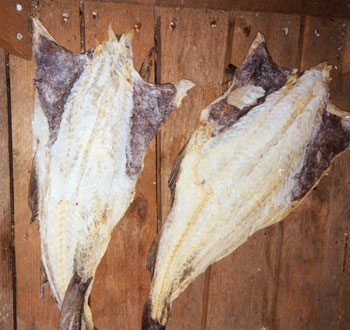Essay
The Wider World - Boom & Bust
Ginseng and Salt Cod

West Indies Islands were important markets for New England foodstuffs such as filleted, dried salt cod.
More info
Courtesy Muzzleloader Magazine
Americans and their British trading partners were eager to resume trade once the war ended. For generations, Massachusetts and other mainland American farmers, shopkeepers and merchants had enjoyed a dependable and lucrative trade with the Caribbean. Devoted to intensive sugar cultivation and production, West Indies planters needed the lumber and foodstuffs Americans were able to supply. In return, West Indies sugar and molasses made their way to colonial rum distilleries, stores and tables. Enslaved Africans deemed undesirable by virtue of age or health to labor on the sugar plantations in the islands, frequently appeared on auction blocks in New England and other colonies. For their part, English merchants were happy to sell finished goods to American and West Indies customers.
But, the rules changed with American independence. Britain's mercantile system was based on keeping colonial trade flowing straight to Britain, and the United States were no longer British. English orders-in-council banned the new United States from the West Indies trade, a devastating blow to American commerce and the local economy it supported. (1) Forced to develop new trade networks, Americans turned to other potential markets and partners, including their new ally, France. Unfortunately, the French proved unsatisfactory trading partners. Americans accustomed to English textiles and other finished goods, found French imports inferior, and French merchants were less willing to extend credit on the liberal terms Americans needed. (2) Trade with China, although promising, was as yet too embryonic and too meager to replace the vital West Indies trade. Besides, it seemed that China did not really want anything Americans could offer except ginseng, and oversupply of this humble root was beginning to disappoint hopeful investors. Americans eager to trade with whomever, and wherever, they wished, were finding it to be easier said than done. (3)
| Print | Top of Page